Physics Meets Literature: Jockers, Dominguez Forge Unique Collaboration
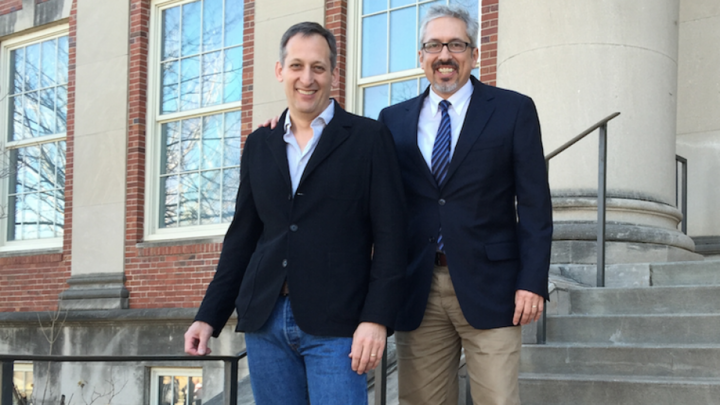
March 24, 2015 | Deann Gayman | University Communications
In what can be viewed as an example of extreme cross-disciplinary collaboration, Matthew Jockers, an associate professor of English at the University of Nebraska-Lincoln, has been consulting with UNL physicist Aaron Dominguez for the past several years in his quest to quantify narrative structure.
Read more at UNL Today.
Sapirstein Uses 3-D Tech to Further Study of Greek Architecture
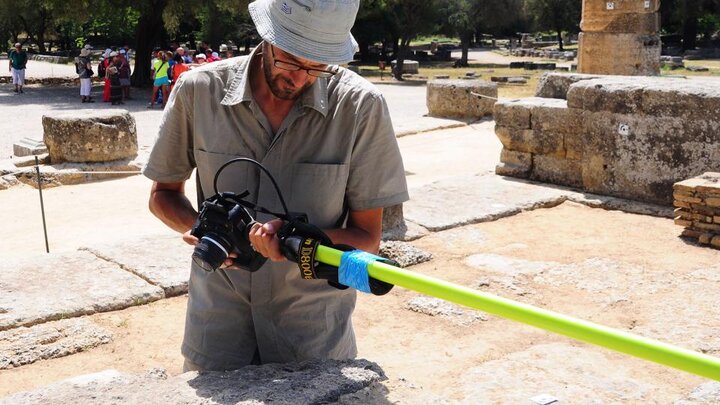
February 8, 2015 | Troy Fedderson | University Communications
As part of UNL's Center for Digital Research in the Humanities, the assistant professor of art history has launched the "Digital Architecture Project." The project uses digital photography and computer software to generate detailed, 3-D models of Greek temples, beginning with the Temple of Hera, a sixth-century B.C. structure at Olympia, Greece.
Read more at UNL Today.
Project Mines 8 Million News Pages for Poetry
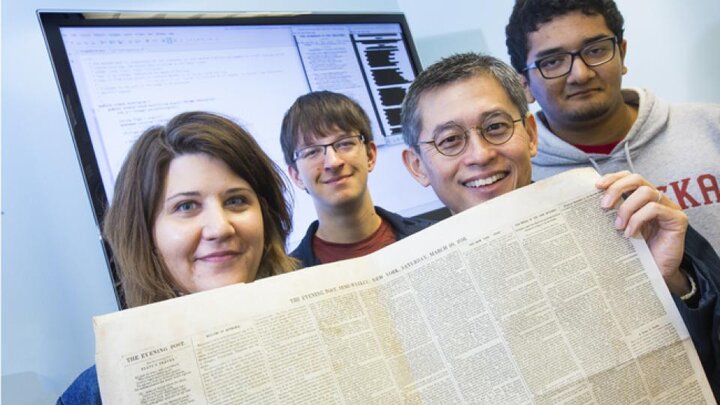
October 13, 2014 | Craig Chandler | University Communications
In the upper left corner of a 19th century newspaper is an example of poetry UNL's Elizabeth Lorang (left) is researching. She is collaborating with Leen-Kiat Soh, associate professor of the computer science and engineering, and students Spencer Kulwicki and Maanas Varma Datla, who have developed software to recognize poetry from digitized newspapers.
Read more at UNL Today or listen to the NET Radio story.
UNL Students to Harvest History of Germans from Russia
October 6, 2014 | University Communications
The UNL family histories project, working with the Germans from Russia community, collected family histories on October 18, 2014 at the American Historical Society of Germans from Russia Museum. Read More at UNL Today.
"Decoding the Lost Diary of David Livingstone"
November 24, 2014
An overview of Dr. Adrien Wisnicki's research on the diaries of David Livingstone was published in Smithsonian Magazine. Read more at Smithsonian Magazine online.
Team to Lead NEH-Funded Project to Digitize Cather Letters
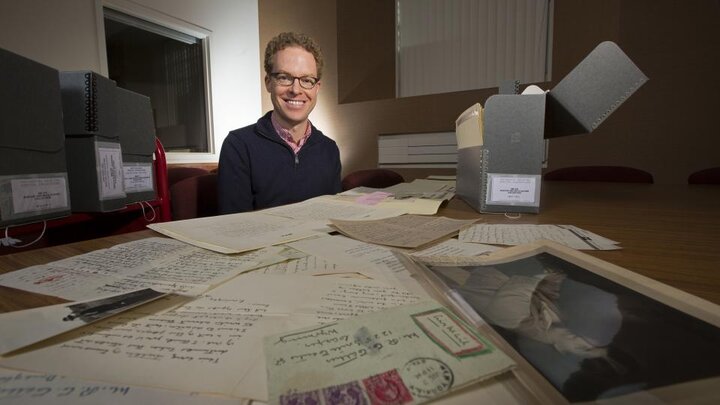
August 27, 2014 | Deann Gayman | University Communications
Last year, about 550 of Willa Cather's letters were made available for the first time in a book, “The Selected Letters of Willa Cather,” co-edited by the CDRH’s Andrew Jewell.
Thanks to a three-year, $271,980 grant from the National Endowment for the Humanities, many more will be digitized and put online by the end of the decade. Read More at UNL Today.
James Coltrain to Present at the 2014 Digital Humanities Forum
July 24, 2014
James Coltrain, Associate Faculty Fellow in the CDRH and History Lecturer, will be presenting at the Digital Humanities Forum 2014, September 12 & 13th, at the University of Kansas Institute for Digital Research in the Humanities. The theme for this year's forum is, "Nodes & Networks in the Humanities: Geometries, Relationships, Processes". Dr. Coltrain's presentation is entitled, "Connecting Digital Humanities Data with the Scholarly 3D Toolkit". An abstract is available on the Forum site linked above.
Lit Lab's Cather Research Spawns International Conference Presentations
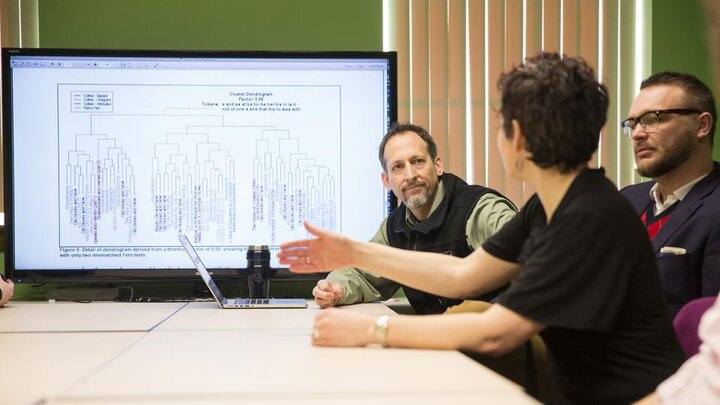
July 2, 2014 | Leslie Reed | University Communications
Three teams of UNL students were selected to give presentations on their use of digital research techniques at the annual conference of the Alliance of Digital Humanities Organizations from July 7-12 at the University of Lausanne in Switzerland. Three of the nine students are undergraduates; the others are pursuing master’s degrees or doctorates. Read More at UNL Today.
Detecting Poetic Content in Historic Newspapers with Image Analysis
March 25, 2014
April’s Faculty Fellows Forum will feature Elizabeth Lorang, Leen-Kiat Soh, Joe Lunde, and Grace Thomas presenting on “Detecting Poetic Content in Historic Newspapers with Image Analysis.”
This presentation will discuss the development of a software system for image processing to aid in the automated identification of poetic content in the 7 million newspaper pages available from Chronicling America. After establishing a context and rationale for this work, the presentation will demonstrate work in progress to identify poetic content in digitized newspapers. They will conclude with a look at lessons learned thus far, next steps, and broader implications of this research.
Announcing the Digital Scholarship Incubator
January 30, 2014
Supported by research and innovation funding from the University of Nebraska-Lincoln Libraries, the Center for Digital Research in the Humanities at UNL announces the creation of the Digital Scholarship Incubator. The Incubator provides research consultations; project coaching and support; access to resources, including hardware, software, people, and materials; work space; project and professional development funding; and professionalizing opportunities. Incubator participants, who must be graduate students enrolled in a humanities degree program at UNL, will be chosen by competitive application.
The Digital Scholarship Incubator is now accepting applications for its first cohort of student fellows. Incubator fellowships will run from March 1, 2014–December 31, 2014. During the fellowship period, students commit to developing a specific contribution to humanities scholarship that depends on digital methodologies for research and/or publication. Students might use the Incubator to kickstart a new research project or to complete an ongoing project (or stage of an ongoing project). Incubator fellows should plan to work in the Incubator space located in Love Library for a minimum of 3-5 hours per week during the academic year.
Invested in their own scholarship, fellows will also support the research of other Incubator fellows through thoughtful dialogue, critical engagement, and knowledge exchange. In addition, fellows commit to presenting their work to a public audience and to participating in training opportunities.
This year is a pilot year for the Digital Scholarship Incubator. Not only will fellows for 2014 help shape the developing model of the Incubator, fellows’ projects will be important for making the case for future support.
To apply, submit a letter of application and cv to Liz Lorang by noon Monday, February 17, 2014. Your letter of application should include a statement of your work in digital humanities; a description of the research you plan to undertake as an Incubator fellow, including projected outcomes from the fellowship period; a description of how this digital research/scholarship fits within your larger program of study and supports your professional goals; and a statement of your research/scholarship needs as you currently understand them.
Prospective applicants are encouraged to contact Liz Lorang with any questions.
Congratulations to Graduate Student Scholarship Recipients
June 24, 2013
Eight Committee on Institutional Cooperation (CIC) graduate students received scholarships from the University of Nebraska-Lincoln to attend the Digital Humanities 2013 conference, July 16-19, 2013:
- Terry Brock, Michigan State University
- Mattie Burkert, University of Wisconsin
- Matt Burton, University of Michigan
- Trey Conatser, The Ohio State University
- Christopher Leeder, University of Michigan
- Thomas Padilla, University of Illinois-Urbana Champaign
- Grant Simpson, Indiana University
- Dawn Taylor, Penn State University
Thanks to a generous earmarked donation, the University of Nebraska-Lincoln’s Center for Digital Research in the Humanities was able to pay registration, travel, and lodging. The Committee on Institutional Cooperation was established by the presidents of the Big Ten Conference members in 1958 as the athletic league’s academic counterpart.
Congratulations to the recipients of these scholarships!
Announcing transcribe.unl.edu, a Collaborative Transcription Effort
February 18, 2013
University of Nebraska-Lincoln alumni, students, and friends are invited to help transcribe digitized documents. The first project is the University of Nebraska-Lincoln Cornhusker Yearbooks, featuring a wide spectrum of university history. The Cornhusker yearbooks are available online at http://yearbooks.unl.edu for everyone to read, but they aren’t yet searchable. We need your help to create transcriptions that will allow greater access to these documents.
You can start by clicking on the “Transcribe Yearbooks” option or by reading the transcription tips we have provided. If you would like to set up an account, it will help you keep track of your own transcriptions, and will help us to acknowledge your valuable contributions to this project.
Whitman Archive Awarded $275,000 NEH Grant
April 3, 2012
The Whitman Archive was awarded a $275,000 grant from the National Endowment for the Humanities to create item-level finding guides to the nearly seventy individual repositories holding Whitman’s prose manuscripts. The finding guides will attach to each description high-quality digital images for all the prose manuscripts. When coupled with the Whitman Archive’s similarly organized and award-winning guides to Whitman’s poetry manuscripts, this project will provide unprecedented documentation of and access to the literary manuscripts of a major literary figure. For more information, visit http://whitmanarchive.org/
Scholarly Editing: The Annual of the Association for Documentary Editing Publishes First Issue
February 24, 2012
We are delighted to announce the debut of Scholarly Editing: The Annual of the Association for Documentary Editing, now online at scholarlyediting.org. Published for over 30 years as a print publication titled Documentary Editing, Scholarly Editing continues to publish articles about the theory and practice of editing and reviews of new editions. In addition to this material, Scholarly Editing offers new, innovative content: the journal is among the first—if not the first—to publish peer-reviewed editions of primary source materials of cultural significance. We are pleased not only to present editors with a rigorously peer-reviewed publication platform, but also to share fascinating documents from cultural history with the reading public. All of this material is available freely online and is completely open-access.
Contents for the 2012 Issue
Introduction
- Introduction to the First Issue of Scholarly Editing: The Annual of the Association for Documentary Editing by Amanda Gailey (University of Nebraska-Lincoln) and Andrew Jewell (University of Nebraska-Lincoln)
Editions
- "The Inscription of Walt Whitman's 'Live Oak, with Moss' Sequence: A Restorative Edition" edited by Steven Olsen-Smith (Boise State University)
- "Selection from Harriet Beecher Stowe’s Uncle Tom’s Cabin: A Digital Critical Edition: 'Topsy'" edited by Wesley Raabe (Kent State University) and Les Harrison (Virginia Commonwealth University)
- "'The Firstling/Erstling/He Complex' by Baroness Elsa von Freytag-Loringhoven" edited by Tanya Clement (University of Texas, Austin) and Gaby Divay (University of Manitoba)
Essays
- "Musical Works, Musical Texts, and Musical Editions: A Brief Overview" by Ronald Broude (The Broude Trust)
- "A 'Succession of Little Occurrences': Scholarly Editing and the Organization of Time in John Tanner’s Narrative" by John Fierst (Central Michigan University)
- "The Common Pot: Editing Native American Materials" by Paul Grant-Costa (Yale University), Tobias Glaza (Yale University), and Michael Sletcher (Yale University)
- "Documentary Editing in the New Scholarly Ecosystem" (Presidential Address, Association for Documentary Editing Annual Meeting, Salt Lake City, Utah, 2011) by Susan H. Perdue (University of Virginia)
Reviews
- The Having of Negroes Is Become a Burden: The Quaker Struggle to Free Slaves in Revolutionary North Carolina By Michael J. Crawford. Gainesville: University Press of Florida, 2010. Reviewed by Donna E. Kelly (North Carolina Office of Archives and History)
- Reminiscences & Traditions of Boston. By Hannah Mather Crocker. Edited by Eileen Hunt Botting and Sarah L. Houser. New England Historic Genealogical Society, 2011. Reviewed by Beverly Wilson Palmer (Pomona College)
- Recent Editions. Compiled by W. Bland Whitley, Reviews Editor (Princeton University)
The Iron Way Named Lincoln Prize finalist
February 13, 2012
William G. Thomas’s The Iron Way: Railroads, the Civil War, and the Making of Modern America (Yale) was selected as a finalist for the 2012 Gilder Lehrman Lincoln Prize. The book, an outgrowth of the Railroads and the Making of Modern America digital archive project, "illuminates the critical impact of railroad construction, railroad management and the boost railroads provided to regional development during and after the Civil War era."
Thomas on New York Times Blog
February 10, 2012
Will Thomas, John and Catherine Angle Professor in the Humanities and Chair of History at UNL, wrote an article on slavery and the railroads for the New York Times. Read the full article.